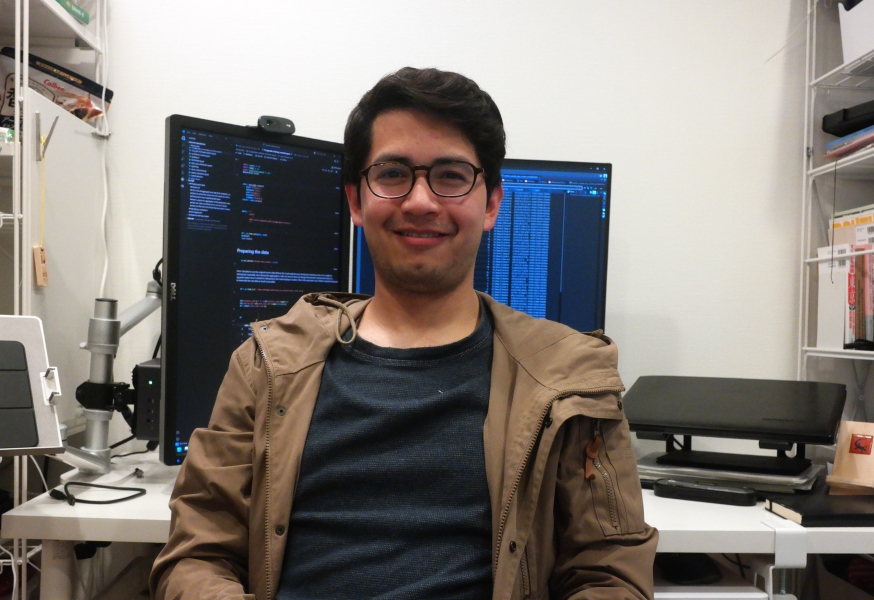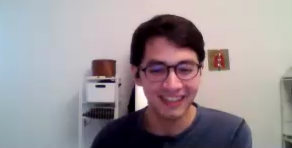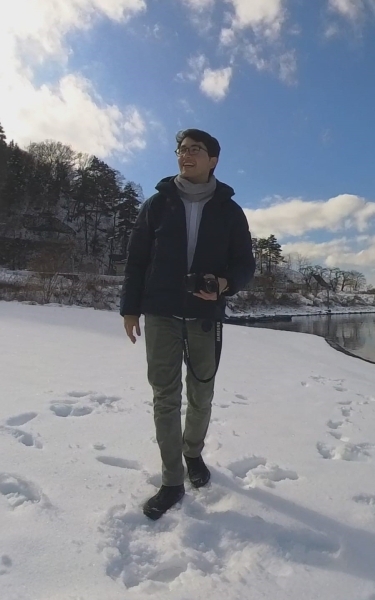Interview Series - Insights from Students -
- Name
- Santiago GARCIA GABILONDO
- Nationality
- Mexico
- School at UTokyo
- Graduate School of Engineering
- Academic Status
- Graduate Student : Doctoral Program
- Date of enrollment UTokyo
- 2021.4-Master Program (Due to the COVID-19 pandemic, the arrival in Japan was in 2022.), 2023.4ー Doctoral Program
- The language used for the interview
- Japanese

Desiring to experience diverse language and culture
Please tell us about the background of your decision to come to the University of Tokyo.
Considering my research topic at the time, there were possibilities for me to pursue my studies in France, Germany, or Japan. However, since I had previously spent a year in France and could understand English, French, and Spanish, I felt like experiencing a language and culture different from what I was familiar with. Consequently, I came across a good program at the University of Tokyo, and that’s why I decided to pursue my studies here.
Did you start studying Japanese after deciding to study abroad?
Yes, I studied at a Japanese language school in my home country for about a year, intending to reach a basic level. However, when I came to Japan, I realized that I couldn’t communicate as well as I thought.
The most challenging experience was when I was looking for an apartment about six months after arriving. I made a reservation online and immediately received a call from the real estate agent. However, I couldn’t understand anything and was in a situation like, “Who is this?” When I said I didn’t understand, the real estate agent stopped using keego (polite expressions) and explained things in a simple and easy-to-understand manner, like talking to a child. I managed to get through it. Only when signing the contract did I ask for help from my Japanese friends in the lab. Looking back, it’s a good memory, but it was really tough.
Relaxation and people-watching at jazz bars
You are now in the doctoral program. What is your life like?
I go to the lab three or four days a week and conduct research at my own pace the rest of the time. In the lab, I communicate with the professor in English, and since most of the other members are also international students, the primary language used is generally English.

So, you hardly use Japanese at the university?
Yes, I hardly use Japanese at the university, but in the evenings and on weekends, when I have time, I sometimes go to a nearby jazz bar or izakaya, where I use Japanese. That’s where I made some good friends.
Oh, please tell us more.
It was by chance that I entered that jazz bar because I got hungry while I was out for a walk on the weekend. At that time, only the owner and one customer were there, the menu was handwritten in Japanese, and I couldn’t find information on Google. The two of them helped me. We gathered around the menu, talked a lot, and became friends. Since then, I occasionally go to that bar and have become friends with musicians and various other customers. Now, I make an order like “Toriaezu beer!” (beer for starters) using Japanese-specific expressions in a manner that sounds natural in Japanese.
Do you speak Japanese with the people at the bar?
Yes, since most of the customers coming to the bar are Japanese. We talk about various topics, including the food that is right in front of us, and occasionally, our conversations revolve around my home country, Mexico.
What I find interesting is that Japanese bars have customers ranging from their 20s to 60s. In Mexico, each bar has a specific age group, so the diverse clientele in Japan is an interesting discovery.
Actually, my current research is related to town planning and human flow, so I also enjoy observing who comes to the bar as part of my research.
Curiosity towards others as motivation
Is your motivation for learning Japanese driven by curiosity or by necessity?
It’s curiosity. Right after coming to Japan, I felt the necessity to learn Japanese, of course, to survive in places like convenience stores. However, within my research department at the University of Tokyo, I probably wouldn’t need to learn Japanese. Even in situations like the earlier interaction with the real estate agent, while it’s better for me to know Japanese, if there’s any problem, I can ask someone for help. However, when it comes to wanting to have a good conversation, engage in specific or deep discussions, I still think it’s better to be able to speak Japanese.
Can you provide any specific examples?
The other day, there was a party because a UTokyo student who had been living in France decided to go back home. Most of the attendees were Japanese. Since I was the only foreigner among the participants, I thought, “Oh, I wish I could speak more Japanese.”
Also, in the lab, there’s a Japanese friend who is interesting and popular and has many friends. When they’re talking in Japanese with others, it seems really enjoyable. However, when I talk to them in English, it feels like some of that enjoyment diminishes. In moments when I want to know more about the person and deepen our relationship, I strongly feel the need to improve my Japanese proficiency.
Aspiring to make small talk on economics and politics in Japanese
While your motivation for learning Japanese may not be necessity, you took an intensive Japanese course. Did you have a specific reason for that?
Because I wanted to improve my Japanese quickly.
Now, aside from classes, there are various ways to learn Japanese, such as watching movies or dramas. Do you have any thoughts on taking Japanese language classes?
I also frequently watch movies and dramas, and I can learn from them. However, if I just use those expressions in regular conversation, I won’t notice whether I’m making mistakes or not. In Japanese classes, I can actually try using Japanese expressions, confirming whether they are correct or incorrect, and learn Japanese in the process. If you want to make progress in learning Japanese, it’s better to take Japanese classes. However, since watching movies and dramas is enjoyable, I think both might be necessary. There are various ways to enjoy input, and if you want to improve your Japanese output skills, taking Japanese classes is effective, I believe.
Do you have any plans or ideas on how you would like to proceed with your future Japanese language learning?
Currently, I feel limited in my understanding of Japanese because I can’t read enough kanji, so I want to learn more of them. There are apps that can teach kanji by scanning them with a smartphone camera, but there’s no guarantee that those apps provide accurate information. Moreover, reading text through a tool can be inconvenient. I have a strong desire to better understand Japanese on my own. Regarding speaking Japanese, I also aim to engage in small talk on topics like economics and politics, just as I used to do in my native language in Mexico.
